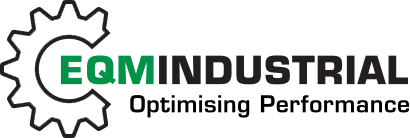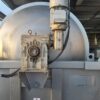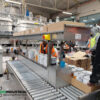Conveyors that Feed Thousands of NZ Children
In 2020, Lunch By Libelle was welcomed as a preferred supplier for the Government’s new Ka Ora, Ka Ako | Healthy School Lunches programme. Phil Llewellyn from PDC was appointed to project manage the addition of a new automated facility at their Hamilton site to meet demand. The new packing room needed to produce tens of thousands of lunches ready for delivery every day.
Phil needed a system that could capture meals coming off two tray sealing lines and combine into one accumulation point in a very tight space. He went searching for a supplier of custom-built rotary accumulation tables and liked what he saw on the EQM website. Impressed with the team’s expertise and experience, the deal was sealed and collaboration began!
With the construction of the custom-built 1900mm-diameter, conical stainless steel rotary table underway, there was a need for crate conveyors to feed and extract the packed crates efficiently.
Stage 1 was now confirmed, designed to operate with one or two people as production volume on the day dictated.
Libelle then added an automated tray leak tester as part of the quality assurance programme. The tester would identify any potential seal punctures, so lunches remained safe for consumption and there was no spillage during transportation. Phil called Anthony for help on how this could be added onto the conveyor system using EQM’s range of carton and crate handling conveyors. Stage 2 was added to the project brief.
Task:
EQM’s initial brief for finding a solution included:
- A purpose-built inverted conical rotary table, with maximum diameter of 2.0m, allowing just enough room for packers to pack trays efficiently into crates positioned at the right height around it.
- A design that was hygienic, food safe, easily cleanable, freestanding, ergonomic and quiet
- A design that maximised the accumulation of meal trays without crushing or stacking them.
- A conveyor underneath the rotary accumulation table to deliver empty crates and take away full ones to a palletising point.
- All designed to fit inside 4m x 5m space.
The requirement for a leak tester created additional challenges. How would the crates be raised from packing height, up to 1100mm high, to enter the leak tester that could only be located within the same room around the corner, again in a very tight space?
In order to solve this new challenge, our Stage 2 additional brief included:
- Convey crates from accumulation rollers and elevate, accumulate, align and index to feed the leak tester and collect after.
- Meals would need to be handled gently at every step to avoid seal punctures and tray damage.
- Design to turn and elevate crates within a 1.0m x 2.0m space.
Solution:
When designing the rotary accumulation table and roller conveyor underneath, we carefully considered the exit conveyors, tray sealers and other automation equipment in our design, to ensure that all the components would work together seamlessly. A full 3D design model was created, refined and approved by the client and all other equipment suppliers.
The rotary table was based on previous pedestal designs, but was much larger in diameter and included a Clean-Geartech stainless steel double reduction IP69K washdown geardrive.
With regards to the leak tester conveyor and the accurate alignment required, EQM solved this by designing a crate elevator based on the EQM N-Track design that had a hygienic blue belt with a grip surface. It hauled crates around a right-angle corner guided by a wheel and elevated them to the leak tester.
The crate conveyors used are both gravity and powered roller conveyors. The latter being fitted with IP69K aluminium Clean-Geartech Z Series geardrives.
All parts were fabricated, assembled and tested, before being delivered on-site. Installation and commissioning of the conveyors took just two days. Advice was given on electrical automation, so all the parts could work together, and by supplying Teco variable speed controllers for each motor and a IP69K S/S electrical enclosure with a sloping top, this was all to suit hygienic design.
Within the first day of production, conveyors were commissioned, then operators and packers were given training, but Libelle staff very quickly worked out how best to use the system effectively. Designing simple, user-friendly systems is one of EQM’s Better By Design benefits.
Benefits:
Meals accumulate smoothly at the end of the line. Packers can load crates without having to move around or bend down. Staff love the system, including the Production Manager, who no longer has the worry of children’s lunches with faulty seals escaping out the door of the production room.
The BDR and N-Track conveyors gently take crates to the leak tester within an extremely tight turning circle and space.
Libelle Group has gone on to provide hot, nutritious lunches to hungry learners in over 150 schools nationwide. Feeding lunch to over 30,000 students every day, it’s provided millions of meals since the start of the programme in 2020.
System Conveyor and Control Features
- Custom-made accumulation point via EQM pedestal conical rotary table.
- Transfer and accumulation of full crates by EQM band-driven powered roller conveyor.
- Crates elevated by EQM N-Track elevator.
- End-of-line accumulation through EQM gravity roller.
- Teco Variable Seed Drives’s housed in IP69K electrical enclosure.
- Meal handling optimised through variable speed controllers on all conveyors.
- Easy-to-operate system in a very tight space.
From tray filling to packing for distribution, minimal labour is now required with this new automation.
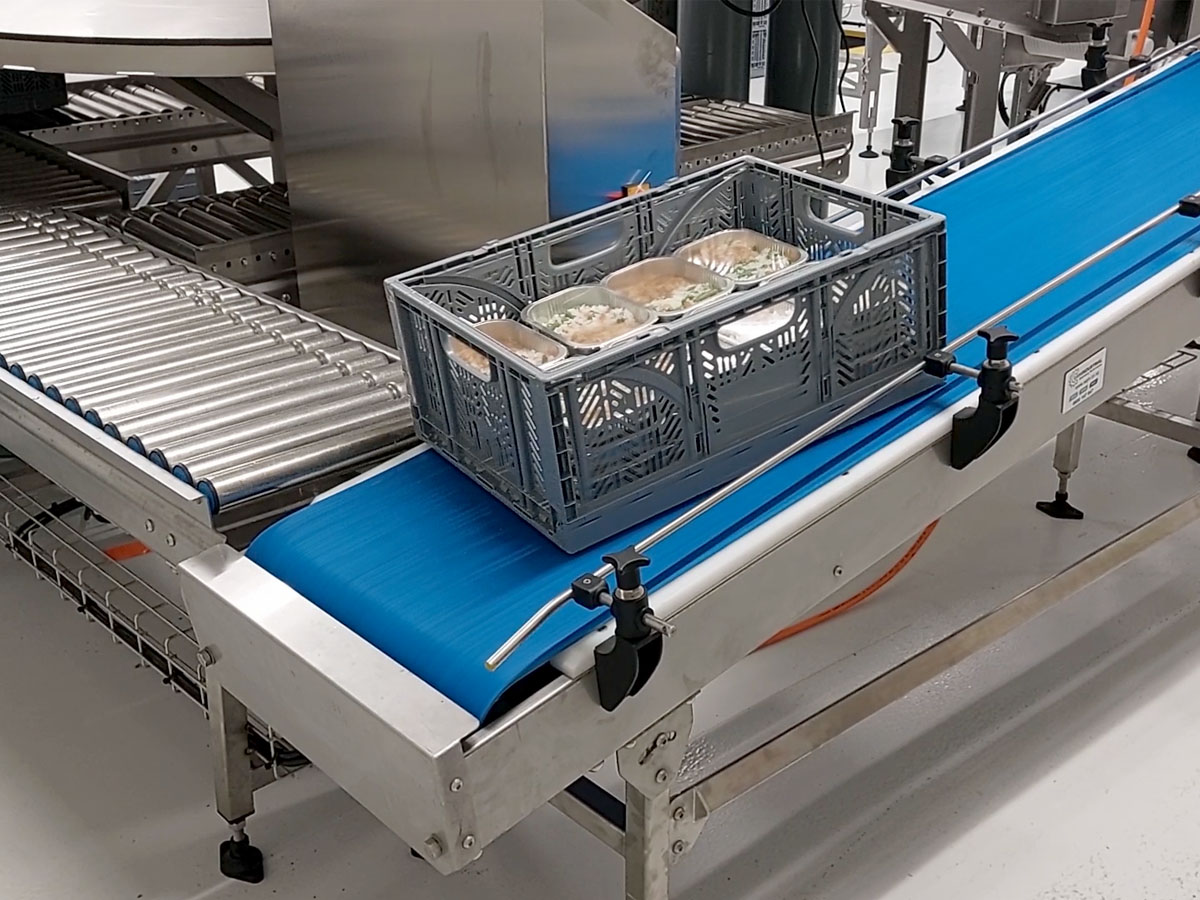
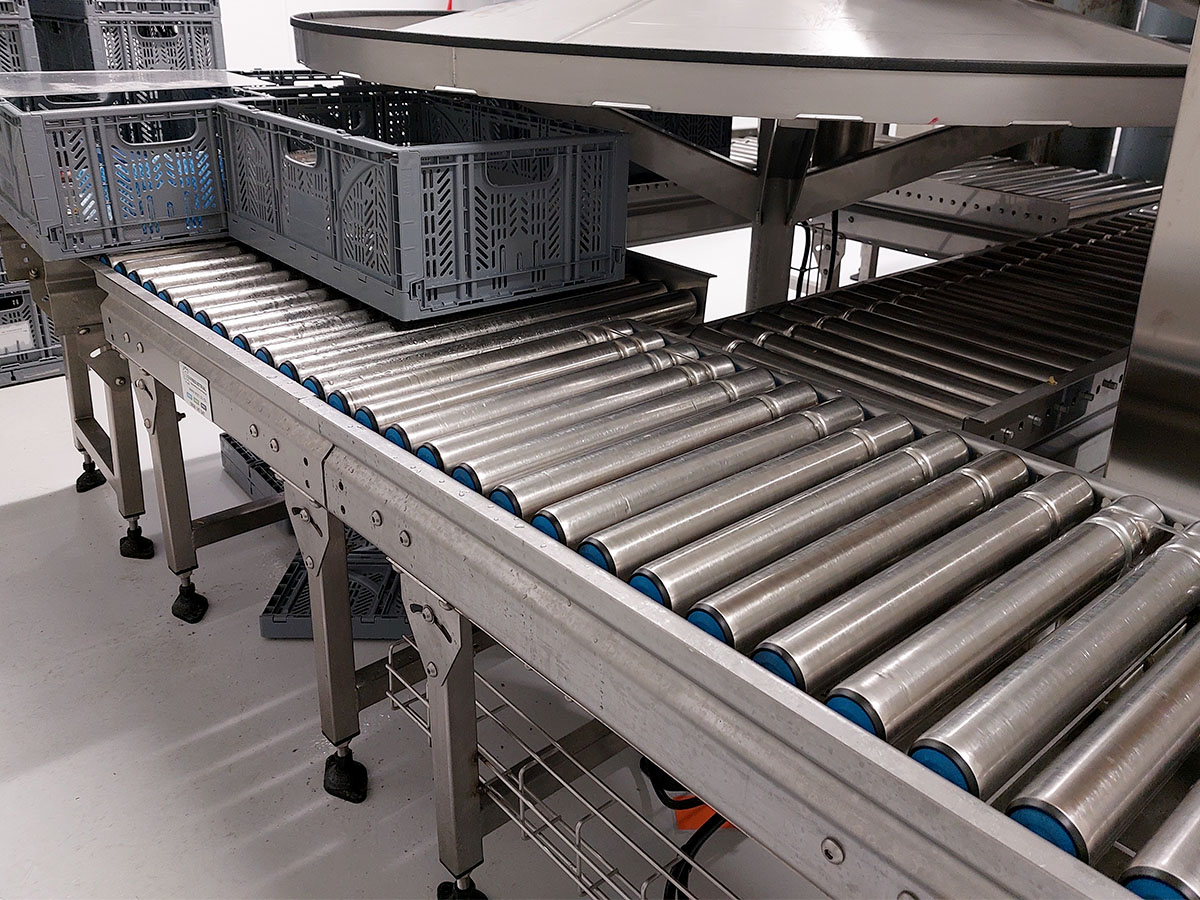
Contact us for a solution to increase productivity on your end-of-line packing at your production line today. Benefit from our knowledge, expertise and experience.
Better by Design.
